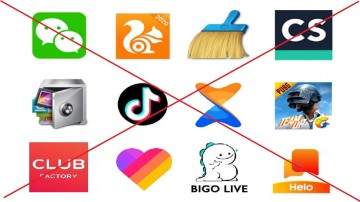The union government has issued fresh orders to ban over 54 Chinese apps terming them as a threat to privacy and security of Indians, officials aware of the development told ET. A number of these apps belong to the stable of large Chinese technology firms such as Tencent, Alibaba and gaming firm NetEase and are “rebranded or rechristened avatars” of apps that have been banned in the country beginning from 2020.
Why these apps were banned?
These 54 apps were banned because they allegedly obtain critical permissions and collects sensitive data of users. Collected real-time data are being misused and are being transmitted to servers located in hostile country.
The list of banned apps includes, Beauty Camera-Selfie Camera, Sweet Selfie HD, Viva Video Editor, Garena Free Fire – Illuminate, Dual Space Lite, Tencent Xriver, Onmyoji Arena and AppLock.
List of Apps that has been banned are
Garena Free Fire
Garena Free Fire is Singapore-based and its developer is not from China. This game was one of the most downloaded games in India 2021. It had filled up the space created by PUBG Mobile after its ban in September 2020. The app was already removed from App store and Play Store in India.
Background
June 2021, the government had banned 59 Chinese apps including the popular short video sharing platform TikTok, UC Browser, WeChat and Bigo Live, saying they were prejudicial to the sovereignty, integrity and security of the country.
Both moves came in the backdrop of India’s ongoing stand-off along the Line of Actual Control (LAC) in Ladakh with China.
What is the constitutional basis of the bans?
The apps were banned in accordance with Section 69A of the Information Technology Act.
Border standoff in eastern Ladakh
The standoff between Indian and Chinese militaries app started in eastern Ladakh border on May 5, 2020, after a violent clash in the Pangong Lake areas. Both sides gradually enhanced their deployment by rushing their soldiers and heavy weaponry. Tension escalated after a deadly clash in the Galwan Valley on June 15, 2020.










